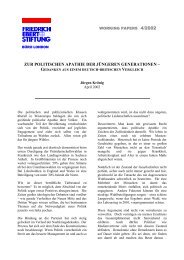Where Now for European Social Democracy? - Policy Network
Where Now for European Social Democracy? - Policy Network
Where Now for European Social Democracy? - Policy Network
Create successful ePaper yourself
Turn your PDF publications into a flip-book with our unique Google optimized e-Paper software.
98WHERE NOW FOR EUROPEAN SOCIAL DEMOCRACY?state does not mean that it should be the sole actor, or even theprincipal <strong>for</strong>ce behind social policy.Conversely, an augmentation of existing social protection withoutlooking at its foundations is no gauge of efficiency. A part of the Leftfinds itself paradoxically in the position of defending the status quo,as if the extension of existing benefits could protect the populationfrom the new risks we are encountering. When it comes to pensions,health insurance, or unemployment, an increase in social spending isnot enough in itself to provide better social guarantees. Moreover, thisapproach places statutes over people. The perverse effects of thisprotection linked principally to employment are well known: the losersin the system pay <strong>for</strong> the protection of the winners.Five principles <strong>for</strong> a new social compromiseThe task is heavy, but is quite simple to spell out: how can we definea social pact which ensures collective guarantees in an age of mobility,individualism and of diversification of risk? This article proposes fivemain principles:First principle: distinguish the risks. The diversification of risksdoes not mean that they should all be treated with the samemechanisms. Since the 1970s, Giddens and Beck, along with others, 5have pointed to the appearance of new risks: medical, ecological andindustrial ... These do not tally with classic social risks. Some haveread this analysis as a diversionary tactic, which marginalises socialrisks by identifying risks as a whole.We have the tendency to underestimate the role of these new risksin the feeling of insecurity which is growing in our societies. This doesnot mean that we should treat all risks identically. It seems essentialthat structures of public prevention should be put in place against thenew risks, which could be arranged thorough mutual funds run by thesectors concerned, such as polluting industries or the pharmaceuticalindustry. Only social risks should be the concern of the social state.Second principle: differentiate <strong>for</strong>ms of protection to ensure thecontinuity of rights. Since professional careers are so diverse, theconsideration of individual circumstances and particular life-courses is



